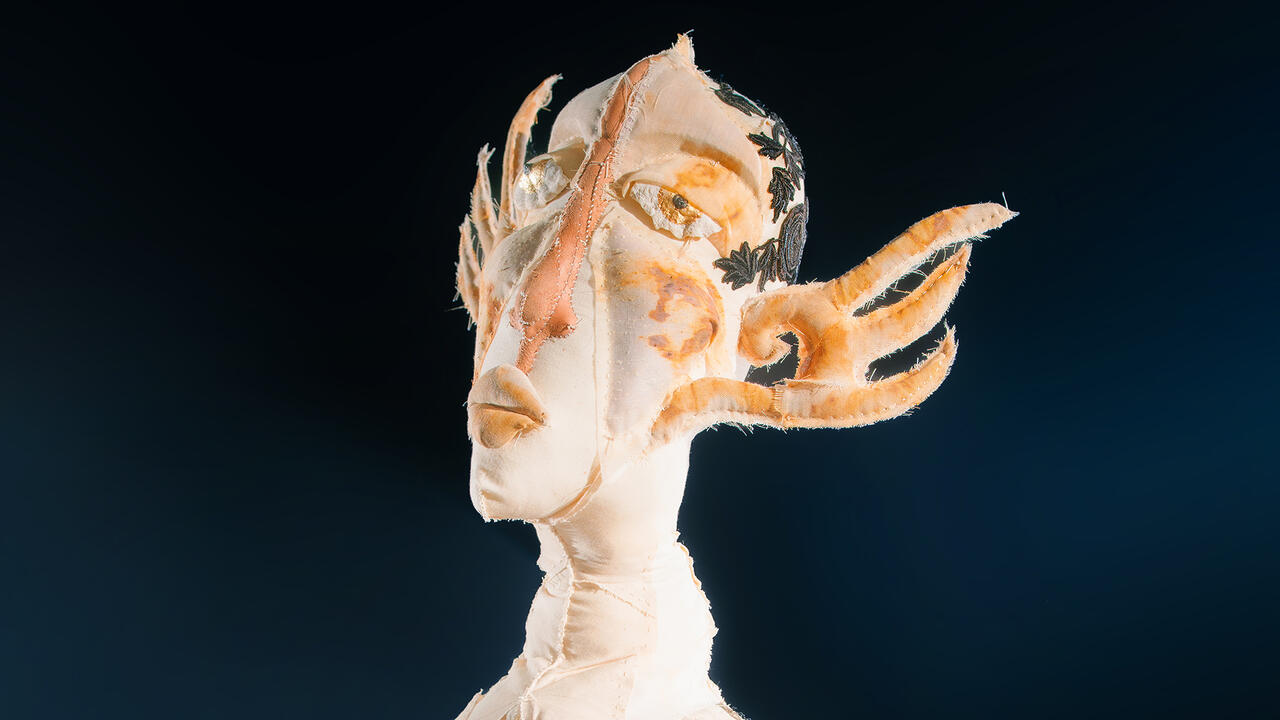American Beauty
Elvis Presley died on Madonna’s 19th birthday, the two stars can be seen as complex and contradictory emblems
Elvis Presley died on Madonna’s 19th birthday, the two stars can be seen as complex and contradictory emblems

Cologne-based collector and former gallerist Rolf Ricke recently told me about a phenomenon he experienced in the late 1960s: brilliant young American artists suddenly abandoning art-making to become organic farmers. They gave up art as their abilities peaked for the first time, often before reaching the age of 30. Lewis Stein, for example, told Ricke: ‘I’ve made my contribution to the art of the 20th century, now I’m through.’ Or Harriet Korman. Or Peter Young, who went to Arizona to farm vegetables and run a hotel for poor people. Or Lee Lozano, who told Ricke as she left New York never to return: ‘My new name is Lee Free, I feel totally free.’ Just like that? For no particular reason? Misogyny in the art world, existential worries and the rise of a new alternative culture are sure to have played a part in such decisions. But there is another theme that emerges here: ambition as an aesthetic problem.
A recent example are television talent shows; many of the contestants are the children of immigrants. These shows have provoked disgust among many middle-class viewers – disgust at unbridled ambition. Likewise, middle-class offspring lament the demise of pop, and the lack of a suitable arena for their own ambition, which, according to the conventions of cool, should be disguised as effortlessness. If an open display of ambition is aesthetically displeasing, then it follows that some overtly sensitive artists might find it so repugnant that they can no longer bring themselves to live through the arduousness of making art. In such cases, vegetable gardens, with their seasonal regularity, may be more attractive – the biblical humility of working in the fields, bent over, head down.
Madonna is one pop star who has climbed the ladder of success without letting any concerns over the ugliness of ambition get in her way. Madonna is ambition.
Ambition has a dead mother. Ambition has a cold father. Ambition has an immigrant grandpa. Ambition has a growing fat-phobia. Ambition erects altars. Ambition feels unloved. Ambition gives interviews gladly at first, later only rarely. Ambition knows it is ensnared by fate.
Madonna embodies America the way Elvis Presley once embodied America, and as she has recalled on several occasions with proprietorial pride, Elvis died on her 19th birthday. It might seem odd for the singer to believe herself mystically linked to Elvis in some way. They are, after all, totally diverse cultural icons. To some degree Elvis still embodies America, although the America he embodies today is that of the old, the overweight, the sad and the ill. These are the unfit people who lack the proverbial ‘healthy dose of ambition’. It is the members of this group who need Elvis the most and who therefore venerate him. With their love of Elvis, ill and broken Americans can love themselves a little.
In the beginning, everything was easy. Elvis Presley’s warm chuckle (later mimicked by Bill Clinton) instantly made the audience forget the sweaty workouts of his dances. But later in his life, it became clear that he had lost something essential – his ambition. He expected his countrymen to say it didn’t matter, but this was asking too much of a nation whose white, male population had been suffering from an impotence trauma since the Great Depression, a trauma only aggravated by the war in Vietnam and the civil rights and women’s movements.
This is not impotence in the sense of an individual, sexual disorder, but that of the distressed male who seeks solace through violence and subjugation. This, as a fantasy, is articulated in American culture in the pulp aesthetic, ranging from detective stories through to the films of Quentin Tarantino. Classic pulp operates with two main types of women: the innocent country girl, whose vulnerability does not rule out blatant erotic display (plunging necklines, bulging breasts), and the vamp who is unwilling to sacrifice herself for love. Both archetypes put the lonely, male hero – always dressed in a trench coat, all the better to conceal his big, big gun – in a position where he must react.
Square jaw, ooo, such a handsome face, why do you have to save the human race? Madonna ‘He’s A Man’ (1990)
Madonna has often borrowed looks and attitudes from pulp. Thanks to the pulp aesthetic, fetish gear and other sexual stimulation aids acquired a major role in American culture. They made not entirely serious appearances in the fun bondage photos of Bettie Page. Today, the breast tape of old has been replaced by the Wonderbra, and the whips, gags and stilettos have been chemically transformed into Viagra. Pulp speaks of a culture of the prosthetic, in which the orthopaedic side of male self-assertion is concealed by an elaborate show.
Towards the end of his life, Elvis began to make a show of illness. This was met not with understanding, but with scorn and derision. It probably was a little too much to ask of those who once saw Elvis’ lithe hips as the greatest symbolic incentive not to abandon the cultural, economic and military battlefields to ‘others’ (women, Native Americans, Afro-Americans, Vietnamese, Koreans) but to keep them in the hands of the white man. And those unfit people and losers who did understand the wonderful human turn taken by the ailing Elvis now wallow drowsily in memories of youth instead of fighting for their right to fail, to get fat, to grow old or sick with any degree of cultural visibility. Where was their outcry when Bill and Hillary Clinton were prevented from introducing universal health care in the USA in the mid-1990s, thus depriving the American struggle for life of its cruellest barb?
In 1972, Elvis recorded his version of ‘Always on my Mind’ – an ode to things left undone, and ultimately his own requiem:
Maybe I didn’t treat you Quite as good as I should have Maybe I didn’t love you Quite as often as I could have.
One cannot love Madonna with the same despairing passion required to love a broken, unhappy person such as Elvis. Once one has learned to embrace an icon’s descent into the gutter, to love in the hope of curing the blind, the crippled and the impotent – all things of which fans are capable – then one knows what addiction is and that ultimately there is no consolation. (Although it’s still a great joy, right?)
And yet Madonna is right when she points to their shared fate. Elvis’ death was a sign of sorts. On 16 August 1977, when this monarch who had lost his ambition, this king of pill-poppers and super-sized people, finally left the building named USA, he made way for someone who replaced rather than perpetuated him. (Today he apparently lives on a vegetable farm in Mexico with Ricke’s former artists, where Thomas Pynchon and J.D. Salinger drop in to help with the harvest.)
How amazed Madonna must have been on her 19th birthday when she looked into all the tearstained faces around her. No one was laughing; no one ate the birthday cake made by her detested stepmother; everyone dissolved into self-pity and pain. No one understood what only she sensed on this magical day. Although ruined by the death of Elvis, this birthday nonetheless gave her a great gift: the realization that Elvis was an ailing, impotent guy who did nothing but spoil the party you’d been looking forward to for so long.
She also realized that this kind of misery was no good for the country in the long run, that the USA needed something strong, something healthy, something that doesn’t spoil your well-deserved special day. She sang about this in her first hit ‘Holiday’ (1983) – a hymn to a happy, healthy day that brings everyone together, a day that’s different to everyday life, which for many people will never come. Of course, though, she doesn’t say that in so many words, the clever woman.
It’s time for the good times
Forget about the bad times, oh yeah
One day to come together
To release the pressure
Pop music was once an ideal way of expressing ambition. It could be worked through physically without being identified as a form of labour, without killing the mood. Madonna’s ambition and her oft-cited ‘will to power’ have even been able to mask her main technical shortcoming, her notoriously petite voice, which in pathos-driven musical genres – such as opera or country – would have been indefensible.
Madonna blends pop and sport at the level of military drill, further emphasizing this aspect of her performances through her choice of costumes. In her work, effort is always noble, and any thought of refusal, decay or illness, of boundaries, misfortune or existential alienation is absolutely banned. This is the root of the relentless humourlessness for which Madonna has always been famous for. Slipping up on the banana skin of life is not something we can expect to see her doing, nor emitting an infectious giggle as consolation.
Emblematic, above all, of the USA of the 1980s, Madonna provided a visual definition of sex for her nation that worked wonderfully even under the shadow of AIDS: libido channelled through a Catholic fixation (‘Like A Virgin’, 1984; ‘Papa Don’t Preach’, 1986) and a focus on giving, but above all taking (‘Pretender’, 1984; ‘Material Girl’, 1985; ‘Hollywood’, 2003). Madonna stands for the USA that confidently and stubbornly denies death – despite huge swaths of the population having no health insurance – driven by the conviction that the dynamism and virility of a free society can only be maintained if that society’s members have good reason to push themselves. She is the goddess of this American brand of existential gymnastics. The fact that she sees herself as an opponent of the Bush administration is not a contradiction; nor is the fact that she has become a figurehead for feminist, homosexual and even, to some extent, African-American and Hispanic self-assurance and idealization: Madonna is presumably just as mistaken about herself as her followers have always been. Members of discriminated minorities that once derived joy and strength from her music now find themselves on the stage of the neo-liberal dance floor asking, along with everyone else, is this all there is?
Madonna has her merits, in the wonderful way she has taught marginalized groups with an affinity for pop that anyone wishing to gain access to the mainstream and its riches must, above all, get their act together. But the practical life lessons emanating from the singer and her music don’t make her a saint. If you take a look at her slightly more discrete side-products – her Kabbalah propaganda, her children’s books – you’re assailed, absurdly enough, by Madonna the desperate moralist. This, if not the rest, must be rejected as metaphysical kidnapping. It also sheds some light on her lack of cheerfulness. Madonna is healthy, beautiful, dominant, self-determined and as heroic as an ancient statue.
Translated by Nicholas Grindell





















